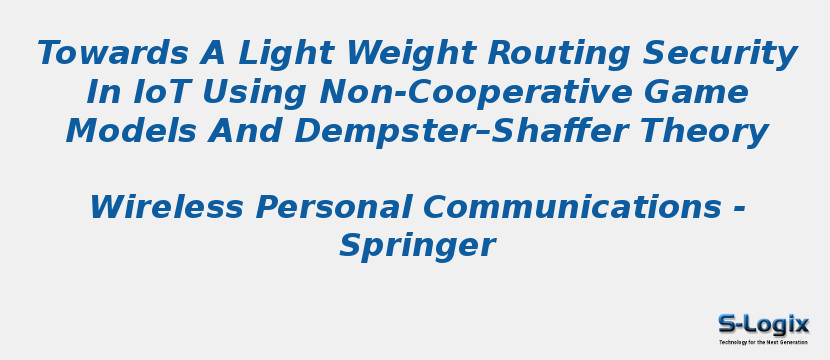Research Area: Internet of Things
The internet of things (IoT) has become an emerging technology owing to the rapidly increasing number of devices and their connectivity to the internet. Routing protocol for low-power and lossy networks (RPL) is a predominant routing protocol for the IoT. The RPL routing embraces the distance to the gateway node as a rank for parent selection and builds the destination oriented directed acyclic graph (DODAG). The malicious nodes utilize the advantage of low rank based parent selection to involve in data forwarding. However, the malicious node behavior and the harsh channel conditions due to the collision are equally considered as malicious in the existing detection mechanisms. In addition, most of the routing solutions exploit the traditional schemes for IoT security, but not considering the adaptability to IoT routing specifications. Thus, this work attempts to integrate the DODAG-specific contextual trust model, and RPL-specific rank variance factor, named as Secure RPL using non-cooperative game MOdels and DEmpster Shaffer Theory in IoT (S-MODEST), such that it can detect the attackers accurately and significantly reduces the resource consumption. The non-cooperative game model consists of two interrelated formulations in the proposed solution. Firstly, non-zero sum game constructs the trust model and extracts the contextual information from DODAG structure to strengthen the trustworthiness. Secondly, the evolutionary game is utilized for trusted router selection. The non-zero sum game theory formulates the interaction of nodes and assists the trust measurement by applying direct and restricted Dempster–Shaffer theory. The DODAG-specific contextual trust evaluation differentiates the collision dropping from the undesirable scenarios and supports the nodes in building a highly trusted DODAG structure to the gateway using multiplicative trust factor. To enforce the routing cooperation of selfish nodes and differentiate malicious nodes, the evolutionary game model embraces the node trust, which is measured using non-zero sum game model. As a result, the non-cooperative game models enable the S-MODEST to precisely select a secure route as well as to maintain the routing performance effectively. The simulation results demonstrate that the detection accuracy and throughput of the proposed context-aware noncooperative game theory based trust model are substantially higher and outperform the existing SecTrust.
Keywords:
Author(s) Name: Vidhu Kiran,Shaveta Rani,Paramjeet Singh
Journal name: Wireless Personal Communications
Conferrence name:
Publisher name: Springer
DOI: 10.1007/s11277-019-06809-w
Volume Information: volume 110, pages 1729–1749 (2020)
